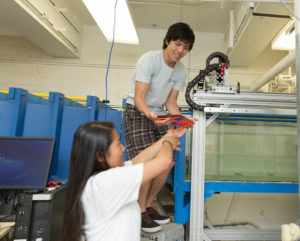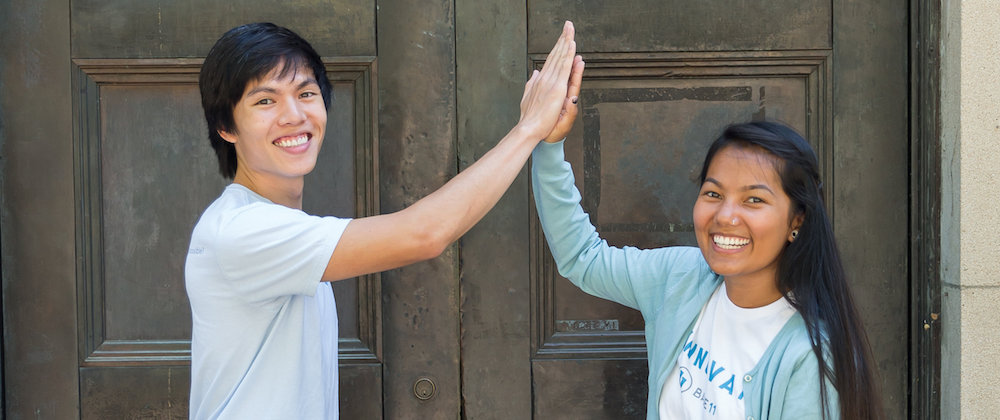By David Huynh, Caltech graduate student
Being a graduate student mentor in the Caltech/Base 11 STEM outreach initiative has been a truly transformative experience for me. I worked individually with Skyline College student Alina Rai when she was a Base 11 fellow for 10 weeks last summer, and have written and led lectures and discussions for a new cohort of students in our academic-year mentorship program. I’ve learned so much about being a mentor (and being a grad student) by interacting with all the Base 11 students. It’s nurtured my flickering passion for teaching and outreach into a healthy flame. In honor of National Mentoring Month, I’m glad to share a few things that stand out in my mind, hopefully to encourage any would-be or already-are-mentors.
1. Foster motivation, because it’s there!
Having met a few rounds of Base 11 students, I have come to see a recurring trait: insatiable motivation. Motivation to sink their teeth into their projects, to learn about the field of aerospace, to take full advantage of the people and environment that make up Caltech; the vast majority of the community college students come in keenly determined to squeeze every drop they can from their experience. One student, I (almost literally) never saw without a solid mechanics or computational methods textbook, including when I bumped into him walking to Chipotle! Another student would fly through his tasks and, rather than ever ask for a break, would ask what he could do or read or learn next. And I couldn’t help but smile as my own intern, Alina, expressed her bewilderment that other interns didn’t contemplate their projects and current roadblocks over the weekend, as she did.
I think two key factors enabled this drive. First, we mentors and our advisers strove to provide the students with a purposeful project and a degree of ownership. A goal with impact coupled with the responsibility to see it through were the nutrients for their determination. Second, I believe that motivation is something that can be willed, should one make the effort to do so. The Base 11 students have always shown that will to be motivated, and it has made them an incredible pleasure to work with.
2. Find the big picture, the small picture and then the right picture.
 An hour lecture and even a 10-week internship are flashes when compared to the time it takes to fully appreciate a theory or a project in the context of its discipline. Perhaps like rock climbing, when we’re new to a field, we generally grapple with the small, seemingly unconnected details in front of us, searching for immediate footholds to which to cling. As we practice and advance, patterns, structure and connectedness emerge. We begin to see not only our local landscape, but the grander formation in which it fits, our ultimate goals therein and potential paths to reach those goals. The challenge is then what and how to convey to a newcomer to best prepare them for their own journey.
An hour lecture and even a 10-week internship are flashes when compared to the time it takes to fully appreciate a theory or a project in the context of its discipline. Perhaps like rock climbing, when we’re new to a field, we generally grapple with the small, seemingly unconnected details in front of us, searching for immediate footholds to which to cling. As we practice and advance, patterns, structure and connectedness emerge. We begin to see not only our local landscape, but the grander formation in which it fits, our ultimate goals therein and potential paths to reach those goals. The challenge is then what and how to convey to a newcomer to best prepare them for their own journey.
Given the relatively short time with the students, I’ve had the most success when I aim to convey the essence of a concept and pull out curiosity for it. I try to find a Goldilocks perspective, not so magnified that we get caught up in the details that will naturally come with time and practice, yet not so far out that we feel overwhelmed and don’t know where to start. On a perfect day, the students leave with a sense of understanding and a hunger to learn more, and I leave with a sense of a complete and meaningful exchange.
3. Give space to grow.
I think where I struggled the most as a mentor was giving the students space to struggle. I found my instinct was to prevent them from “feeling bad,” to keep the gaps small enough that they never stumbled. But too much handholding does the students a great disservice, taking away an opportunity for them to hone their critical thinking skills and develop their confidence. At this stage, having the right answer is inconsequential compared to developing the process to find the right answer. One of the best pieces of advice I received from another mentor was to provide as little input as possible with my mentee; simply ask questions and stay quiet. It was remarkable how much Alina would synthesize when given the chance and the need. And I could tell the turning point in my summer with Alina, when I would suggest action items and she would light up and tell me she had thought the same thing and had done them already. I think it made the world of difference that she came up with the solutions.
4. Be a part of another’s success.
 At the end of the summer, Alina delivered her final presentation and knocked my socks off. Even compared to our practice just the day before, she was fantastic. Her slides were clear, her pacing and volume were spot on, and most of all, her confidence radiated through. She had absolutely transformed in a mere ten weeks. And as she beamed, I couldn’t help but beam too. And it was unlike the feelings of accomplishment that I’d felt before, because it was not me who had accomplished this, but Alina. By her time and effort, she had grown herself to this point, and I had the privilege of supporting her growth. That summer was her success, and I was able to be a part of it. And that was more rewarding than I ever could’ve imagined.
At the end of the summer, Alina delivered her final presentation and knocked my socks off. Even compared to our practice just the day before, she was fantastic. Her slides were clear, her pacing and volume were spot on, and most of all, her confidence radiated through. She had absolutely transformed in a mere ten weeks. And as she beamed, I couldn’t help but beam too. And it was unlike the feelings of accomplishment that I’d felt before, because it was not me who had accomplished this, but Alina. By her time and effort, she had grown herself to this point, and I had the privilege of supporting her growth. That summer was her success, and I was able to be a part of it. And that was more rewarding than I ever could’ve imagined.
To those in a position and with the interest to take up a mentoring role, I hope you seize the opportunity. It’s an experience that, if you allow it to, will make you a better mentor, teacher, student and more. Plus it’s a boatload of fun! So go for it and then add your experiences to the list!
Check out Alina’s tips to young women who are pursuing STEM degrees here.

